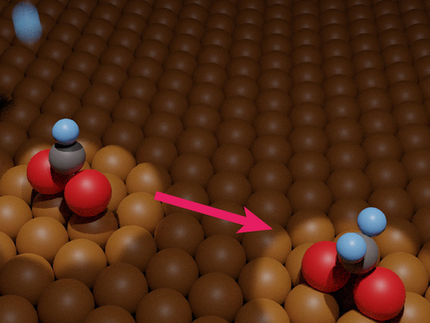Beyond Oil and Gas
The methanol economy: Solution to the energy problem and an end to global warming?
Oil, natural gas and coal are our most important sources of energy and the indispensable starting materials for many everyday products, from gasoline to plastics and a variety of pharmaceuticals. Thanks to better exploitation and new discoveries, the estimated worldwide oil and natural gas reserves seem to remain undiminished-a misleading image.
"If we continue at the current rate of use and take into account the growing population on earth," explains George A. Olah (Nobel Prize for Chemistry 1994) in an essay in Angewandte Chemie, "the verified reserves of relatively easily accessible oil will only last for another 40 years." Though hydrogen has so far been assumed to be the alternative energy source of the future, a better solution now seems to be emerging: methanol.
Could stepwise conversion to a methanol economy solve our energy problems? Olah believes so: "In contrast to hydrogen, methanol is an easily obtained liquid energy carrier, suitable as a fuel and also a good raw material for the synthesis of the basic products of chemical industry." Methanol is an optimal "storage medium" for hydrogen, which can easily be retrieved and fed into hydrogen fuel cells. "The next step toward a methanol economy is the methanol fuel cell," says Olah, "these directly convert methanol and air to carbon dioxide and water."
Olah's team, together with scientists of JPL Laboratory of Caltech, developed direct methanol fuel cells that could potentially power mobile phones and computers; the next goal is to drive motor scooters and cars. "In the longer run this method of generating electricity could also be used in power plants," Olah states optimistically.
Currently, methanol is still produced from fossil fuels, especially from syngas, a mixture of carbon monoxide and hydrogen derived from natural gas (Fischer-Tropsch chemistry). Olah's group developed methods for the direct conversion of natural gas (methane) into methanol. A true methanol economy could do without natural gas, oil and coal. Says Olah: "Methanol could, in the future, be formed from the reaction of carbon dioxide with hydrogen." Exhaust gases from power plants and many industrial emissions contain considerable amounts of carbon dioxide, which can in future easily be isolated. Rather than costly collecting the greenhouse gas carbon dioxide and storing trouble for the future, as has been discussed, it could be used in an expedient fashion by conversion to methanol. However, Olah goes one step further, arguing for the use of atmospheric carbon dioxide. But at 0.037%, its presence in the atmosphere is slight, so the success of this concept rests on effective methods of isolation.
Olah's research group is working on their development. "Atmospheric carbon dioxide is available to all people on the earth. The energy needed for methanol production may come from nuclear power plants as well as alternative sources such as solar, wind, and geothermal energy. The methanol economy could finally free humanity from its dependence on fossil fuels. At the same time, it can diminish the danger of global warming caused by a rising carbon dioxide content in the atmosphere," says Olah.
Other news from the department science
Most read news
More news from our other portals
See the theme worlds for related content
Topic world Synthesis
Chemical synthesis is at the heart of modern chemistry and enables the targeted production of molecules with specific properties. By combining starting materials in defined reaction conditions, chemists can create a wide range of compounds, from simple molecules to complex active ingredients.

Topic world Synthesis
Chemical synthesis is at the heart of modern chemistry and enables the targeted production of molecules with specific properties. By combining starting materials in defined reaction conditions, chemists can create a wide range of compounds, from simple molecules to complex active ingredients.



























































